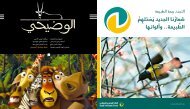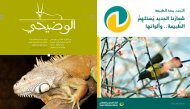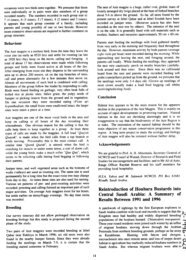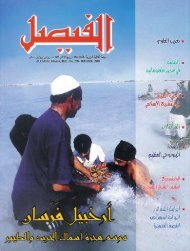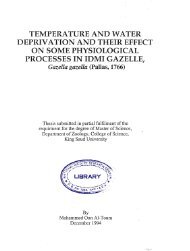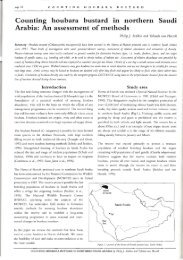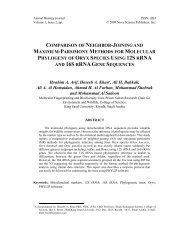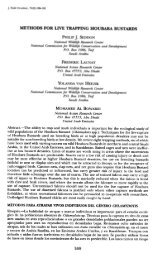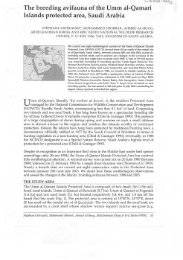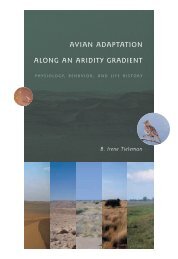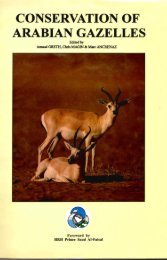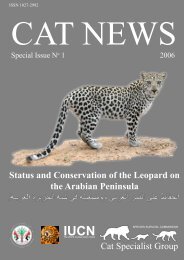The Unfenced Desert Towards a strategy for eco ... - Nwrc.gov.sa
The Unfenced Desert Towards a strategy for eco ... - Nwrc.gov.sa
The Unfenced Desert Towards a strategy for eco ... - Nwrc.gov.sa
Create successful ePaper yourself
Turn your PDF publications into a flip-book with our unique Google optimized e-Paper software.
Key seasons : Re-established houbara bustards nest between January and<br />
May each year. Ungulates may drop calves in any month of the year, but are most<br />
vulnerable to disturbance during the summer, June - September.<br />
Cultural Features<br />
Traditional uses : Seasonal grazing lands <strong>for</strong> camels, sheep and goats; hunting<br />
of gazelles<br />
137<br />
Cultural importance : Old Haji (pilgrim) road runs through the area, roughly from<br />
east to west, and marked with milestones. This however, is not a feature of significant<br />
current cultural interest.<br />
Historical features : Apart from the pilgrim, there are a limited number of prehistoric<br />
sites, with worked flint, stone circles and remnant gazelle traps.<br />
PA Infrastructure<br />
Border demarcation : <strong>The</strong> entire 220 km perimeter is fenced with 2m high chainlink<br />
fencing, topped with 3 strands of barbed wire and with 0.9m of chicken mesh<br />
buried in the ground, and lying behind a large earth embankment. Posts are set in<br />
concrete. <strong>The</strong>re are seven gates, all of which are kept closed with padlocks. Padlock<br />
keys are issued to all rangers and research staff.<br />
Rangers/other staff : <strong>The</strong>re are 8 NCWCD rangers working in Mahazat as-<br />
Sayd. All rangers are based at the Mammal Camp, and all work under the direct<br />
authority of the NCWCD, with local co-ordination of activities through NWRC-based<br />
staff.<br />
NWRC and NWRC-based research staff undertake projects in Mahazat as-<br />
Sayd on oryx, gazelle, small mammals, mammalian carnivores, houbara, ostrich,<br />
vultures and general avifauna. Ostrich research is based at the Mammal Camp,<br />
whereas houbara, small mammal, mammalian carnivore and general avifauna<br />
research is based at the Bird Camp. Work on oryx, gazelle and vultures is undertaken<br />
by staff utilising both camps. Four full-time staff work in Mahazat as-Sayd, with up to<br />
four more working in the reserve intermittently.<br />
Both camps have cooks and labourers. At the Mammal Camp there is one<br />
cook assigned to the rangers and two cooks/labourers assigned to the researchers.<br />
<strong>The</strong> Bird Camp has two cooks/labourers. Labourers working with research staff are<br />
additionally trained to provide technical asistance, e.g. with radio telemetry.<br />
General maintenance is undertaken by the NWRC Maintenance department<br />
which sends a mechanic to the reserve one day each week.<br />
Care of animals in enclosures, translocation of animals <strong>for</strong> release, and the<br />
post-mortem examination of animals found dead in the reserve is the responsibility of<br />
the NWRC Veterinary department, which sends a veterinarian to Mahazat as-Sayd<br />
one day each week.<br />
Responsibilities of rangers : Prior to August 1995 NCWCD rangers undertook only<br />
the monitoring of free-ranging oryx and patrols of the perimeter fence. A review of the<br />
role of rangers in Mahazat as-Sayd during May to August 1995 resulted in a<br />
reduction and restructuring of the reserve's ranger <strong>for</strong>ce. Rangers' duties have been<br />
expanded to now include public relations activities in the surrounding districts,<br />
supervision of visiting groups, and assistance with broader monitoring and research<br />
programmes as required, in addition to the monitoring of oryx and patrolling of the<br />
fence.NCWCD rangers primarily undertake patrols of the reserve's boundaries and




